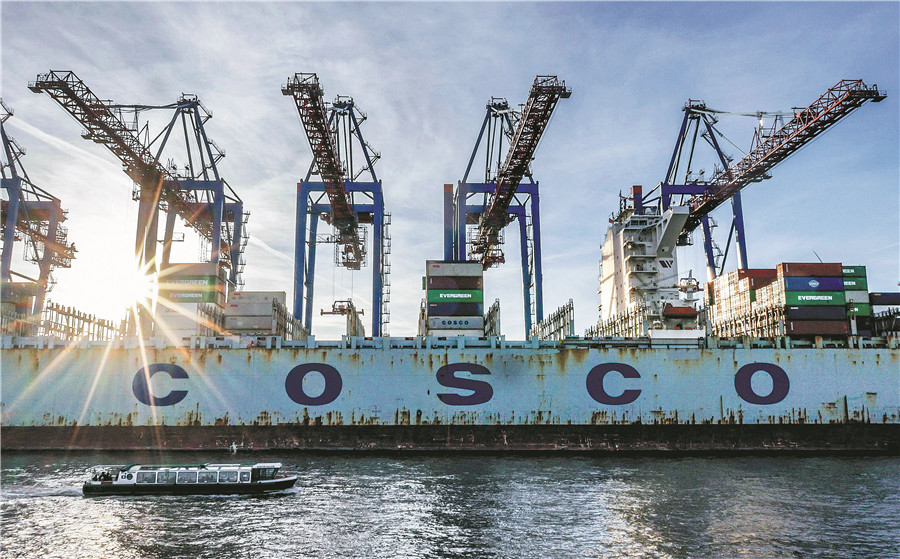Chinese, European leaders seek stable ties


Face-to-face meetings held amid growing global challenges, complicated geopolitics
On Nov 10, a group of German business executives wrote a joint opinion article for the daily Frankfurter Allgemeine Zeitung, warning against pressure to withdraw from the vast China market that has served the German economy well.
The authors included the CEOs of industrial conglomerate Siemens, chemical manufacturing giant BASF, pharmaceutical company Merck, auto parts supplier Schaeffler, industrial machine manufacturer Trumpf, the port of Hamburg and the technology companies Bosch and Heraeus.
They said German companies' sites in China and elsewhere in the world contribute significantly to their competitiveness, and that China has become the world's second-largest and most dynamic market.
"So our presence there is particularly important in the interest of German economic strength," they wrote.
The business leaders argued that the Chinese market's potential offers an opportunity to expand faster and to be more successful in other markets — securing jobs in Germany.
While admitting the issues that exist between China and Germany, the CEOs voiced deep concern about the overemphasis on systemic rivalry, referring to the European Union, which since 2019 has described China as a cooperation partner, an economic competitor and a systemic rival, a definition that China opposes.
"Despite all the challenges of China and with China, we are convinced that its fundamental growth dynamic will remain. A withdrawal from China would cut us off from these opportunities," they wrote.
The opinion article was published six days after German Chancellor Olaf Scholz visited Beijing. He met with President Xi Jinping and Premier Li Keqiang, and brought with him a delegation comprising heads of a dozen industrial giants, including Volkswagen, BMW, Deutsche Bank, Siemens, BASF, Bayer, Merck and BioNTech.
Scholz's visit also came amid fresh debate in Germany and the EU about whether Germany, Europe's largest economy, is too dependent on China after EU member states tried hard in the past nine months to reduce dependency on Russian energy following the Russia-Ukraine conflict.
Scholz traveled to China several times as finance minister and mayor of Hamburg, but this was his first trip to the nation since becoming chancellor in December last year. He is also the first EU leader to visit China since the COVID-19 pandemic emerged nearly three years ago.
In an article published a day before his trip, Scholz noted the differences on some political and geopolitical issues between the two countries, but made clear his opposition to economic decoupling from China and to a new Cold War.
"Germany, of all countries, that had such a painful experience of division during the Cold War, has no interest in seeing new blocs emerge in the world," he wrote.
"Even in changed circumstances, China remains an important business and trading partner for Germany and Europe. We do not want to decouple from it."
While Scholz noted the need to dismantle one-sided dependencies through smart diversification, he said this requires prudence and pragmatism.
"A significant amount of trade between Germany and China concerns products where there is neither a lack of alternative suppliers nor a risk of dangerous monopolies. Instead, China, Germany and Europe benefit equally," he wrote.
Jochum Haakma, chairman of the EU-China Business Association, said Scholz's visit was "very opportune and timely", as Germany is China's biggest European investment and trading partner.
"There is a great interdependency between Europe and China, and Germany is one of the biggest players on the European side. Open talks between both leaderships on the highest level to share different perceptions, but striving to reach common goals could be very meaningful," he said. "I don't believe in isolation and containment."
Ding Chun, director of the Center for European Studies at Fudan University, said Scholz's visit to China and the meeting between Xi and other European leaders at the G20 Summit in Bali, Indonesia, last month shows that European nations are different from the United States.
"They (Europeans) want to maintain contacts, cooperation and normal economic and trade ties with China and to jointly tackle global challenges. This is good for China-Germany and China-EU ties, especially in the sense that there will be no economic decoupling," he said.
Scholz's trip to China will be followed by a visit on Thursday by European Council President Charles Michel at the invitation of President Xi, who was re-elected general secretary of the Communist Party of China at its 20th National Congress in October.
In addition to meeting Xi, Michel will hold talks with Premier Li and Li Zhanshu, chairman of the Standing Committee of the National People's Congress, the nation's top legislature.
French President Emmanuel Macron said on Nov 16 that he intends to visit China at the start of next year.
At the annual meeting of the Asia-Pacific Economic Cooperation intergovernmental forum in Bangkok, Thailand, last month, Macron urged heads of state and government to avoid the world being divided into blocs of influence.
"It's a huge mistake," he said, referring to the fact that a growing number of countries are being forced to choose between the US and China.
Macron and several other European leaders are resisting US pressure on European countries to comply with Washington's geopolitical moves to tighten semiconductor export curbs to China.
Dutch Foreign Trade Minister Liesje Schreinemacher, referring to US pressure on the Netherlands regarding semiconductor export controls on China, told the media, "The Netherlands will not copy the American measures one-to-one."
The Netherlands is home to ASML, the largest global producer of chipmaking devices.























